沪版英语because的用法详解(含练习)
because用法归纳总结
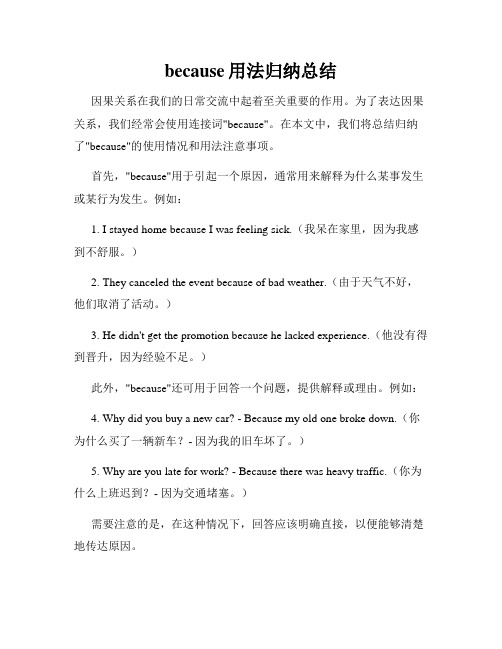
because用法归纳总结因果关系在我们的日常交流中起着至关重要的作用。
为了表达因果关系,我们经常会使用连接词"because"。
在本文中,我们将总结归纳了"because"的使用情况和用法注意事项。
首先,"because"用于引起一个原因,通常用来解释为什么某事发生或某行为发生。
例如:1. I stayed home because I was feeling sick.(我呆在家里,因为我感到不舒服。
)2. They canceled the event because of bad weather.(由于天气不好,他们取消了活动。
)3. He didn't get the promotion because he lacked experience.(他没有得到晋升,因为经验不足。
)此外,"because"还可用于回答一个问题,提供解释或理由。
例如:4. Why did you buy a new car? - Because my old one broke down.(你为什么买了一辆新车?- 因为我的旧车坏了。
)5. Why are you late for work? - Because there was heavy traffic.(你为什么上班迟到?- 因为交通堵塞。
)需要注意的是,在这种情况下,回答应该明确直接,以便能够清楚地传达原因。
此外,"because"还可以与副词或短语一起使用,以提供更详细的原因解释。
例如:6. They couldn't attend the party because they were out of town.(他们不能参加派对,因为他们不在城里。
)7. He failed the exam because he didn't study enough.(他考试没通过,因为他没学够。
because原因状语从句用法(一)
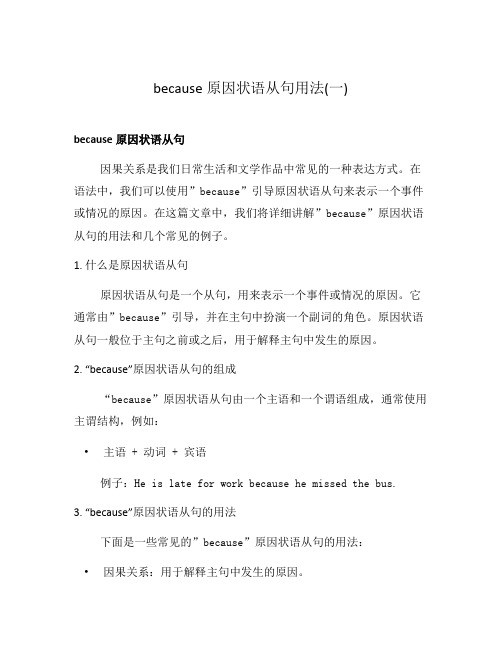
because原因状语从句用法(一)because原因状语从句因果关系是我们日常生活和文学作品中常见的一种表达方式。
在语法中,我们可以使用”because”引导原因状语从句来表示一个事件或情况的原因。
在这篇文章中,我们将详细讲解”because”原因状语从句的用法和几个常见的例子。
1. 什么是原因状语从句原因状语从句是一个从句,用来表示一个事件或情况的原因。
它通常由”because”引导,并在主句中扮演一个副词的角色。
原因状语从句一般位于主句之前或之后,用于解释主句中发生的原因。
2. “because”原因状语从句的组成“because”原因状语从句由一个主语和一个谓语组成,通常使用主谓结构,例如:•主语 + 动词 + 宾语例子:He is late for work because he missed the bus.3. “because”原因状语从句的用法下面是一些常见的”because”原因状语从句的用法:•因果关系:用于解释主句中发生的原因。
例子:She couldn’t attend the meeting because she was sick.•解释原因:用于提供一个解释或理由。
例子:He didn’t finish his homework because he was too tired.•解释结果:使用否定结构,说明某事没有发生的原因。
例子:They didn’t go on vacation because they didn’t have enough money.•描述感受:用于描述人的感受、想法或态度。
例子:He was sad because his best friend moved away.4. “because”原因状语从句的位置“because”原因状语从句可以放在主句之前或之后,具体位置取决于写作或口语的需要。
例子:•Because he missed the bus, he is late for work.•He is late for work because he missed the bus.5. 与其他从句的区别“because”原因状语从句与其他类型的从句(时间状语从句、目的状语从句等)有所不同。
沪教版八年级下册Unit7语法知识点
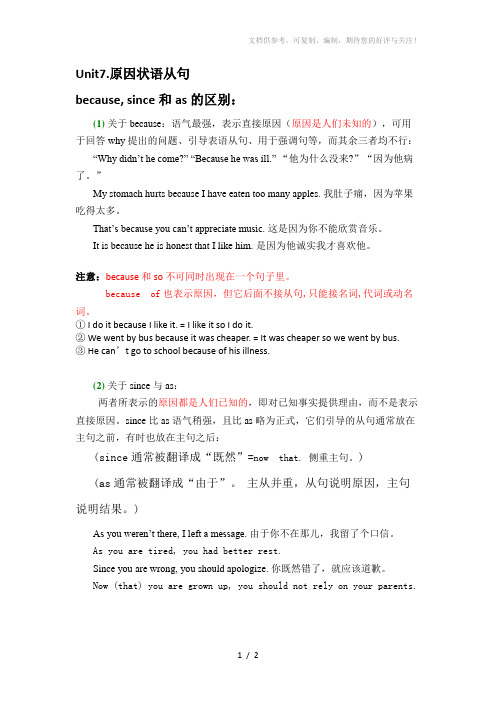
Unit7.原因状语从句because,since和as的区别:(1)关于 because:语气最强,表示直接原因(原因是人们未知的),可用于回答 why 提出的问题、引导表语从句、用于强调句等,而其余三者均不行:“Why didn’t he come?” “Because he was ill.”“他为什么没来?”“因为他病了。
”My stomach hurts because I have eaten too many apples. 我肚子痛,因为苹果吃得太多。
That’s because you can’t appreciate music.这是因为你不能欣赏音乐。
It is because he is honest that I like him. 是因为他诚实我才喜欢他。
注意:because和so不可同时出现在一个句子里。
because of也表示原因,但它后面不接从句,只能接名词,代词或动名词。
①I do it because I like it.=I like it so I do it.②We went by bus because it was cheaper.=It was cheaper so we went by bus.③He can’t go to school because of his illness.(2)关于 since 与 as:两者所表示的原因都是人们已知的,即对已知事实提供理由,而不是表示直接原因。
since 比 as 语气稍强,且比 as 略为正式,它们引导的从句通常放在主句之前,有时也放在主句之后:(since通常被翻译成“既然”=now that. 侧重主句。
)(as通常被翻译成“由于”。
主从并重,从句说明原因,主句说明结果。
)As you weren’t there, I left a message.由于你不在那儿,我留了个口信。
As you are tired, you had better rest.Since you are wrong, you should apologize. 你既然错了,就应该道歉。
because和becauseof的用法区别习题(答案及解析)
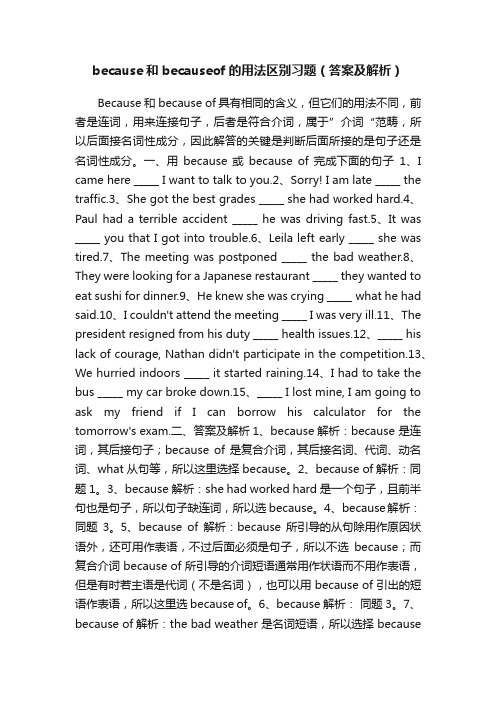
because和becauseof的用法区别习题(答案及解析)Because 和 because of 具有相同的含义,但它们的用法不同,前者是连词,用来连接句子,后者是符合介词,属于”介词“范畴,所以后面接名词性成分,因此解答的关键是判断后面所接的是句子还是名词性成分。
一、用because 或because of 完成下面的句子1、I came here _____ I want to talk to you.2、Sorry! I am late _____ the traffic.3、She got the best grades _____ she had worked hard.4、Paul had a terrible accident _____ he was driving fast.5、It was _____ you that I got into trouble.6、Leila left early _____ she was tired.7、The meeting was postponed _____ the bad weather.8、They were looking for a Japanese restaurant _____ they wanted to eat sushi for dinner.9、He knew she was crying _____ what he had said.10、I couldn't attend the meeting _____ I was very ill.11、The president resigned from his duty _____ health issues.12、_____ his lack of courage, Nathan didn't participate in the competition.13、We hurried indoors _____ it started raining.14、I had to take the bus _____ my car broke down.15、_____ I lost mine, I am going to ask my friend if I can borrow his calculator for the tomorrow's exam.二、答案及解析1、because解析:because 是连词,其后接句子;because of 是复合介词,其后接名词、代词、动名词、what 从句等,所以这里选择 because。
because的六点用法
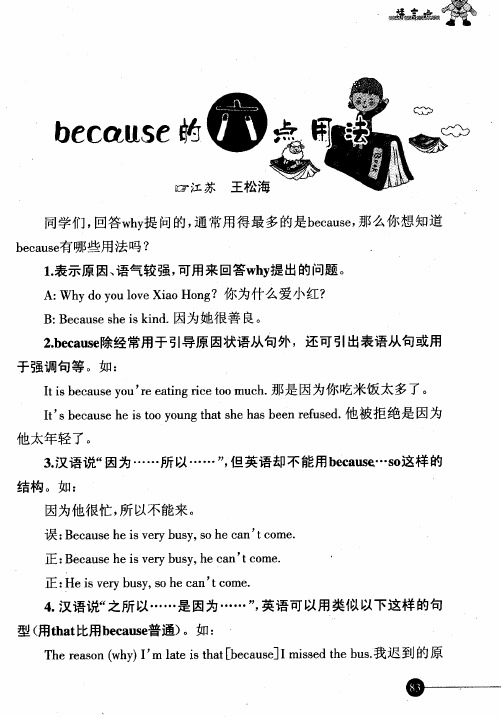
Y o u s h o u l d n ’ t g e t a n g r y j u s t b e c a u s e s o m e p e o p l e s p e a k i l l o f y o u . 你 不 要 因为有 人说你 坏话 而生气 。
结 构 。如 :
因为他 很忙 , 所 以不 能来 。
误: B e c a u s e h e i s v e r y b u s y , s o h e c a n ’ t c o m e .
正: B e c a u s e h e i s v e y r b u s y , h e c a n’ t c o me . 正: He i s v e r y b u s y , S O h e c a n’ t c o me . ’
B : B e c a u s e s h e i s k i n d . 因 为她很 善 良。
2 . b e c a u s e 除经 常用 于 引导原 因状 语从 句外 ,还 可 引 出表语 从句 或 用
于 强调句 等 。如 : I t i s b e c a u s e y o u ’ r e e a t i n g r i c e t o o m u c h . 那 是 因为你 吃米饭 太 多 了。
I t ’ s b e c a u s e h e i s t o 0 y o u n g t h a t s h e h a s b e e n r e f u s e d . 他 被拒 绝 是 因 为
他 太年轻 了。 3 . 汉 语 说“ 因为 … …所 以… … ” , 但 英语 却 不 能 用b e c a u s e …S O 这样 的
6 . 由于b e c a u s e o f 用 作 复合 介 词 , 其 后 可接 名 词 、 代词、 动名 词 、 wh a t
连词because用法详解
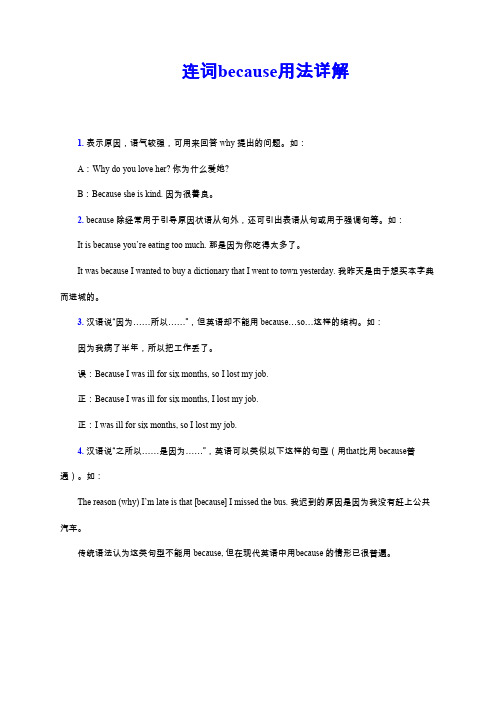
连词b ecause用法详解1.表示原因,语气较强,可用来回答why 提出的问题。
如:A:W hy do you love her? 你为什么爱她?B:B ecause she is kind. 因为很善良。
2.because 除经常用于引导原因状语从句外,还可引出表语从句或用于强调句等。
如:It is because you’re eating too much. 那是因为你吃得太多了。
It was because I wanted to buy a dictionary that I went to town yesterday. 我昨天是由于想买本字典而进城的。
3.汉语说“因为……所以……”,但英语却不能用because…s o…这样的结构。
如:因为我病了半年,所以把工作丢了。
误:B ecause I was ill for six months, so I lost my job.正:B ecause I was ill for six months, I lost my job.正:I was ill for six months, so I lost my job.4.汉语说“之所以……是因为……”,英语可以类似以下这样的句型(用t hat比用because普通)。
如:The reason (w hy)I’m late is that [b ecause]I missed the bus. 我迟到的原因是因为我没有赶上公共汽车。
传统语法认为这类句型不能用because, 但在现代英语中用b ecause 的情形已很普遍。
5.在n ot…b ecause…这一结构中,n ot 有时否定主句,有时否定从句,具体视语境而定。
一般说来,若not 否定主句,最好在b ecause 之前用逗号,否则会引起歧义,如下句在没有特定上下文时就有两种解释:I didn’t go because I was afraid.这个句子既可理解为“我没有去是因为怕”,也可理解为“我不是因为怕才去”。
because知识点用法

because知识点用法在英语中,单词"because"是一个连词,用于表示原因或解释。
它将一个原因与一个结果进行连接,使得语句更加连贯和合理。
以下是一些关于"because"连词的常见用法和例句:1. 使用"because"引导原因状语从句:"I couldn't attend the party because I had to work late."(我不能参加派对,因为我得工作到很晚。
)2. 使用"because of"表达原因或解释:"He couldn't come to the meeting because of a family emergency."(他因为家庭紧急情况无法参加会议。
)3. "because"后面通常跟着完整的句子,而不是短语或单词:错误示范:I didn't go out because raining.正确示范:I didn't go out because it was raining.(我没出门,因为下雨了。
)4. "because"可以位于句首或句中,但通常在句子中间使用逗号分隔:"Because it was raining, we decided to stay indoors."(因为下雨了,我们决定呆在室内。
)"We decided to stay indoors because, it was raining."(我们决定呆在室内,因为下雨了。
)请注意,使用"because"时应注意以下几点:- 不要滥用"because",过多的使用会使句子变得累赘。
- 避免使用复杂的句子结构,以免造成理解困难。
because从句用法

because从句用法一、because从句的基本用法1. 引导原因状语从句- 在句子中,because从句用来解释主句动作或状态发生的原因。
例如:I'm happy because I got a new job.(我很开心,因为我得到了一份新工作。
)这里“because I got a new job”清楚地说明了“我很开心”的原因。
- She didn't go to school because she was ill.(她没去上学,因为她病了。
)“because she was ill”是“她没去上学”的直接原因。
2. 位置灵活- Because it was raining heavily, we stayed at home.(因为雨下得很大,我们就待在家里了。
)because从句放在句首时,通常要用逗号与主句隔开。
- We cancelled the picnic because the weather was bad.(我们取消了野餐,因为天气不好。
)这里because从句放在主句后面,不需要逗号。
二、because从句的固定搭配1. because of + 名词/代词/动名词- I was late because of the traffic jam.(我迟到是因为交通堵塞。
)这里“the traffic jam”是名词短语,用because of来引出迟到的原因。
- He couldn't sleep because of his headache.(他因为头疼睡不着。
)“his headache”是名词短语,和because of搭配。
- She was scolded because of being rude.(她因为举止粗鲁而被责骂。
)“being rude”是动名词短语,与because of搭配表示原因。
2. not...because...(并非因为...)结构- I don't love you because you are rich.(我不是因为你有钱才爱你。
连词because的用法

连词because的用法一、引言:对连词because的说明和作用介绍(200字左右)在英语写作中,连词起着连接句子和表达因果关系的重要作用。
其中,连词because因为其明确而简洁的表达方式,常常被广泛使用。
本文将详细介绍连词because的用法,并通过举例说明其正确的运用。
二、引导原因关系的because(300字左右)1. 连接两个句子形成复合句连词because常用于连接一个独立子句与一个从属子句,将两个句子有机地结合起来。
例如,“I stayed home because I was feeling unwell.”(我呆在家里是因为我感觉不舒服。
)这个例子中,第一个从属子句“I stayed home”表示行为动作,而第二个独立子句“I was feeling unwell”则解释了原因。
2. 表示原因或理由当单独使用时,连词because可以引导一个简单句表达某事物发生的原因或提供解释理由。
“Why did you quit your job?”(你为什么辞职了?)“Because I found a better opportunity elsewhere.”(因为我在其他地方找到了更好的机会。
)这个例子中,“Because”连接前后两个简单句,并对前者提供了解释。
三、引导推理关系的because(400字左右)1. 引导导致结果的原因连词because也可以引导一个从属子句来表达某种行为或情况产生的结果。
“He missed the train because he overslept.”(他错过了火车,因为他睡过头了。
)在这个例子中,由于他睡过头,所以错过了火车这是结果。
连词because很好地呈现了两个事件之间的直接因果关系。
2. 表示推理和推断当使用连词because进行推理时,它提供了一种逻辑推论或合理猜测。
例如,“The roads are wet because it rained all night.”(路面湿滑是因为整夜都下雨了。
because在句子中的用法
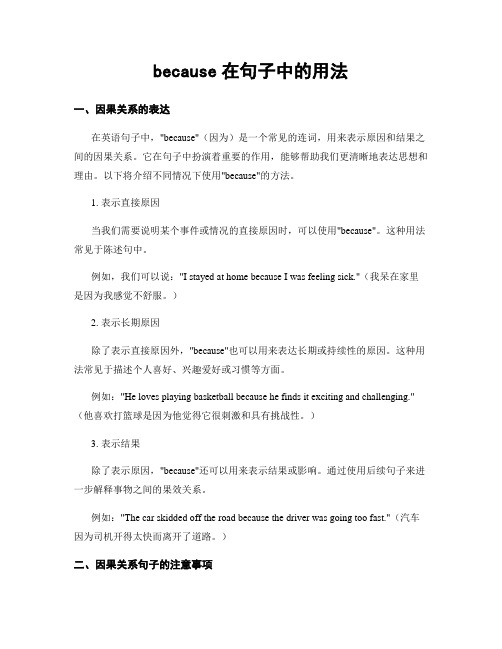
because在句子中的用法一、因果关系的表达在英语句子中,"because"(因为)是一个常见的连词,用来表示原因和结果之间的因果关系。
它在句子中扮演着重要的作用,能够帮助我们更清晰地表达思想和理由。
以下将介绍不同情况下使用"because"的方法。
1. 表示直接原因当我们需要说明某个事件或情况的直接原因时,可以使用"because"。
这种用法常见于陈述句中。
例如,我们可以说:"I stayed at home because I was feeling sick."(我呆在家里是因为我感觉不舒服。
)2. 表示长期原因除了表示直接原因外,"because"也可以用来表达长期或持续性的原因。
这种用法常见于描述个人喜好、兴趣爱好或习惯等方面。
例如:"He loves playing basketball because he finds it exciting and challenging."(他喜欢打篮球是因为他觉得它很刺激和具有挑战性。
)3. 表示结果除了表示原因,"because"还可以用来表示结果或影响。
通过使用后续句子来进一步解释事物之间的果效关系。
例如:"The car skidded off the road because the driver was going too fast."(汽车因为司机开得太快而离开了道路。
)二、因果关系句子的注意事项在使用"because"构建因果关系句子时,有一些注意事项需要遵守。
1. 顺序要清晰应该将原因(因)放在前面,结果(果)放在后面。
这样能够保持句子的逻辑性并使意思更加清晰。
2. 避免歧义在表达因果关系时,要确保所用的原因与结果之间没有混淆或歧义。
句子的结构和上下文都要支持所表达的意思。
Because,since,as,for的用法练习

Because,since,as,for的用法练习●Because, since, as, forbecause, as, for, since这几个词都是表示“原因”的连词,语气由强至弱依次为:because→since →as→for;其中because, since, as 均为从属连词,引导原因状语从句;而for 是并列连词,引导并列句。
1. because表示直接原因,它所指的原因通常是听话人所不知道的,其语气最强。
常用来回答why的提问,一般放于主句之后,也可以单独存在。
例如:(1)I stayed at home because it rained. 因为下雨我呆在家里。
(2)Because Lingling was ill, she didn't come to school. 玲玲因病,没有上学。
(3)—Why is she absent? 她为什么缺席?—Because she is sick. 因为她病了。
此外,在强调句型中,只能用because。
例如:(4)It was because I missed the early bus that I was late for school. 我上学迟到是因为我没有赶上早班汽车。
2. since侧重主句,从句表示显然的或已为人所知的理由,常译为“因为”、“既然”,语气比because稍弱,通常置于句首,表示一种含有勉强语气的原因。
例如:(1)Since he asks you, you'll tell him why. 他既然问你,那就告诉他为什么吧。
(2)Since everyone is here, let's start. 既然大家都到齐了,我们就出发吧!(3)Since I understood very little Japanese, I couldn't follow the conversation. 我日语懂得不多,因而听不懂对话。
英语重点词汇辨析because,because of,since,as for
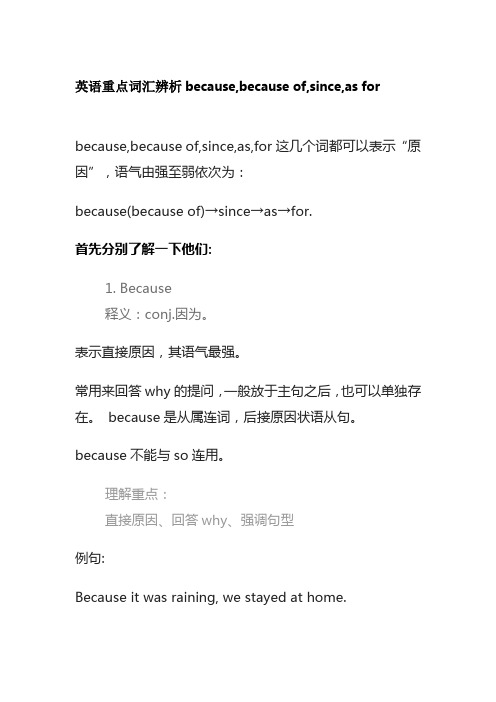
英语重点词汇辨析because,because of,since,as forbecause,because of,since,as,for这几个词都可以表示“原因”,语气由强至弱依次为:because(because of)→since→as→for.首先分别了解一下他们:1. Because释义:conj.因为。
表示直接原因,其语气最强。
常用来回答why的提问,一般放于主句之后,也可以单独存在。
because是从属连词,后接原因状语从句。
because不能与so连用。
理解重点:直接原因、回答why、强调句型例句:Because it was raining, we stayed at home.因为下雨,所以我们得呆在家里。
Why you choose this sport?你为什么选择这项运动?He left because he didn't want to be tagged as a soap star.他之所以离开是因为他不想被人称作是肥皂剧明星。
2.Because of释义:conj.因为,由于(说明)表示直接原因,其语气最强。
because of是个介词短语,不可以引导原因状语从句,而应该接名词、代词、动词的ing形式或者名词性从句等。
理解重点:直接原因例句:Because of my country accent, people identified me with a homely farmer's wife.由于我的乡下口音,人们将我等同于平常的农妇。
The team might be seeded because of their pull within soccer's international body.凭其在国际足球机构的影响力,该队有可能被定为种子队。
Many quite reasonable people were at panic stations because of popular unrest.许多相当理智的人由于普遍的不安情绪也处于紧张状态。
because的用法归纳_用法辨析 英语语法.doc

because的用法归纳_用法辨析1. because 表示的是必然的因果关系,语气最强,通常放在主句之后,若需强调则放在主句之前2. 通常用来回答why提出的问题。
如:A:Why can’t you do it now?你为什么不现在就做呢?B:Because I’m too busy. 因为我太忙。
3. 可引导从句作表语。
如:It is because he is foolish. 那是因为他太蠢了。
4. 可用于强调句。
如:It is because he is honest that we likehim. 是因为他诚实我们才喜欢他。
5. notbecause这一结构中的not 有时否定主句,有时否定从句,一般要根据句子的意思作出正确或合乎逻辑的理解。
若not否定主句,最好在because之前用逗号,否则会引起歧义,如下句在没有特定上下文时就有两种解释。
如:I didn’t go because I was afraid.(1) 我没有去是因为怕。
(2) 我不是因为怕才去。
不过若because之前有just修饰,一般认为not 是否定从句而不是主句。
如:You shouldn’t get angry just because some people speakill of you. 你不要因为有人说你坏话而生气。
He was not readyto believe something just because Aristotle said so. 他并不只是因为亚里士多德说过如何如何,就轻易相信它。
6. 表示的原因是因为这一意义时,一般要用下面这样的句型。
如:The reason why he can’t come is that he is tired. 他不能来是因为他累了。
在这一结构中尽管不少人认为可将that改用because, 但也有不少人反对这一用法,学生宜慎用。
7. 汉语习惯上说因为所以,但在英语里却不能将so与because 连用。
because的用法及短语 (2)
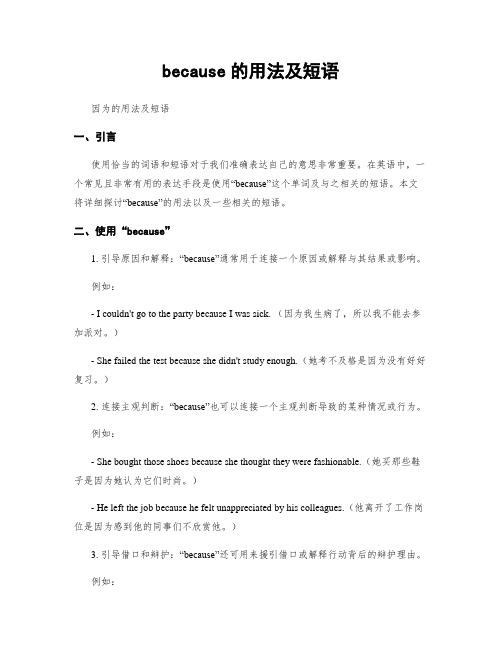
because的用法及短语因为的用法及短语一、引言使用恰当的词语和短语对于我们准确表达自己的意思非常重要。
在英语中,一个常见且非常有用的表达手段是使用“because”这个单词及与之相关的短语。
本文将详细探讨“because”的用法以及一些相关的短语。
二、使用“because”1. 引导原因和解释:“because”通常用于连接一个原因或解释与其结果或影响。
例如:- I couldn't go to the party because I was sick. (因为我生病了,所以我不能去参加派对。
)- She failed the test because she didn't study enough.(她考不及格是因为没有好好复习。
)2. 连接主观判断:“because”也可以连接一个主观判断导致的某种情况或行为。
例如:- She bought those shoes because she thought they were fashionable.(她买那些鞋子是因为她认为它们时尚。
)- He left the job because he felt unappreciated by his colleagues.(他离开了工作岗位是因为感到他的同事们不欣赏他。
)3. 引导借口和辩护:“because”还可用来援引借口或解释行动背后的辩护理由。
例如:- I ate the cake because it was about to expire.(我吃了蛋糕因为它就要过期了。
)- He didn't reply to your message because he lost his phone.(他没有回复你的消息是因为他丢了手机。
)三、常见短语1. “because of”:用于连接原因与结果,强调一个事件或情况对另一个造成的影响。
例如:- She missed her flight because of traffic congestion.(她错过了飞机是因为交通拥堵。
because的用法归纳总结

because的用法归纳总结一、“because”的基本用法1.1 表示原因“because”是一个连词,用于引导一个句子的原因或解释。
它通常在主句之前,连接主句和从句。
例如:I stayed at home today because I was sick.(我今天呆在家里是因为我生病了。
)1.2 because of与due to的区别同样用于表示原因的词还有“because of”与“due to”。
这两个短语都可以在句中作为介词短语使用,但具体含义和用法稍有不同。
“Because of”通常用于具体表达某个事件或情况引起的原因,其后接名词或名词性短语,表达一种客观数量较大且相对抽象的概括性原因。
例如:He couldn't attend the meeting because of bad weather.(他由于恶劣天气无法参加会议。
)“Due to” 在句中更多地强调造成结果、影响的事物或情况。
例如:The game was canceled due to heavy rain.(比赛被取消是因为大雨。
)二、表示程度上的“because”2.1 副词修饰“Because”也可用来表示程度上类似于“so” 或“very”的意思,它通常被用作一个独立的副词修饰名词或形容词。
例如:He is popular because handsome.(他很受欢迎是因为英俊。
)She was late because tired.(她迟到了因为疲倦。
)2.2 更正与修饰“Because”还可以用来更正前文中所表达的内容,对于之前给出的解释进行修饰,并且说明后面所给的解释或理由更准确或重要。
例如:She did not attend the meeting, because, actually, she had never been invited.(她没有参加会议,因为实际上,她从未受邀。
)三、“because”与其他连词的比较3.1 “because”与“as”“As”也是一个连词,表示原因或理由。
because的用法及例句

because的用法及例句一因为的基本用法“因为”是一个连词,用来引导一个原因或解释一个原因。
在英语中,我们常常用“because” 来表达某种结果发生的原因。
接下来的文章将详细介绍“因为”的多种用法及例句。
二因果关系1. “因为”的直接表达方式当我们要说明某个事件的原因时,可以使用“because”来引导原因状语从句。
例如:“I couldn't attend the party because I was feeling ill。
” 这句话中,“because I was feeling ill”就是说明去不了派对的原因。
2. “由于”的替换方式除了直接使用“because”,我们还可以使用“due to”,“owing to”,“as a result of” 等短语来替代,以丰富表达方式。
比如:“The match was canceled due to the heavy rain.”(比赛被取消是因为大雨),“The delay in delivery is owing to the strike.”(交货延迟是由于罢工)。
三递进关系1. 给出理由并补充信息当我们想提供更多支持性信息时,可以使用副词进行修饰。
“Because”后面可以加上这些修饰语,如:“He didn't pass the test because he hadn't studied enough.” (他没有通过考试是因为他没有学习足够)。
2. 进一步说明有时候我们需要进一步解释一个原因或者为添加细节而使用“because”。
例如:“I didn't eat the cake because I'm on a diet.”(我没有吃蛋糕是因为我正在减肥)。
“Because”的使用使得句子更加清晰明了。
四“因为”在表达意愿和结果中的用法1. 表达意愿有时候,我们用“because” 来表达某种愿望。
because作为连词的用法
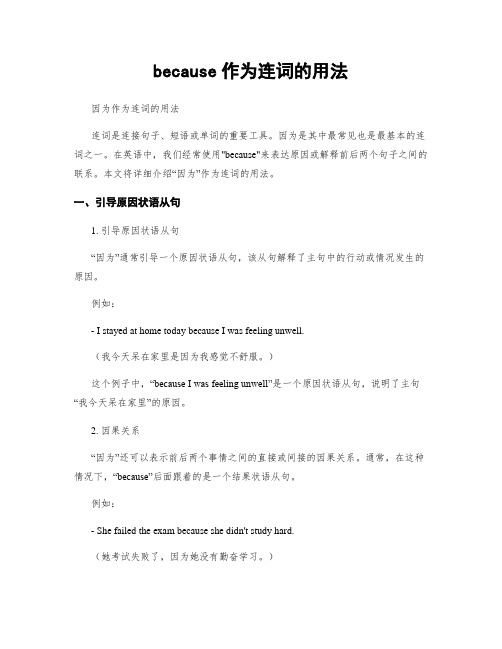
because作为连词的用法因为作为连词的用法连词是连接句子、短语或单词的重要工具。
因为是其中最常见也是最基本的连词之一。
在英语中,我们经常使用"because"来表达原因或解释前后两个句子之间的联系。
本文将详细介绍“因为”作为连词的用法。
一、引导原因状语从句1. 引导原因状语从句“因为”通常引导一个原因状语从句,该从句解释了主句中的行动或情况发生的原因。
例如:- I stayed at home today because I was feeling unwell.(我今天呆在家里是因为我感觉不舒服。
)这个例子中,“because I was feeling unwell”是一个原因状语从句,说明了主句“我今天呆在家里”的原因。
2. 因果关系“因为”还可以表示前后两个事情之间的直接或间接的因果关系。
通常,在这种情况下,“because”后面跟着的是一个结果状语从句。
例如:- She failed the exam because she didn't study hard.(她考试失败了,因为她没有勤奋学习。
)这个例子中,“because she didn't study hard”表达了失败和不努力学习之间的直接因果关系。
二、用法注意事项1. 词序问题在原因状语从句中,通常的词序是主语+谓语。
和主句中的词序相同。
然而,当主句为否定形式时,原因状语从句的谓语动词将改为肯定形式。
例如:- He arrived late because his car broke down.(他迟到了,因为他的车坏了。
)- He didn't arrive on time because his car didn't break down.(他没有按时到达,因为他的车没有坏。
)在第一个例子中,主句是肯定形式,并引导了一个原因状语从句;而在第二个例子中,主句是否定形式,并且原因状语从句的谓语动词变成了肯定形式。
because的用法总结
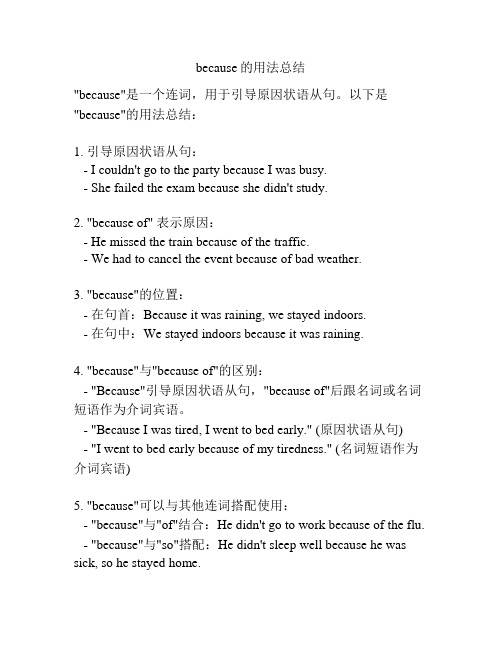
because的用法总结"because"是一个连词,用于引导原因状语从句。
以下是"because"的用法总结:1. 引导原因状语从句:- I couldn't go to the party because I was busy.- She failed the exam because she didn't study.2. "because of" 表示原因:- He missed the train because of the traffic.- We had to cancel the event because of bad weather.3. "because"的位置:- 在句首:Because it was raining, we stayed indoors.- 在句中:We stayed indoors because it was raining.4. "because"与"because of"的区别:- "Because"引导原因状语从句,"because of"后跟名词或名词短语作为介词宾语。
- "Because I was tired, I went to bed early." (原因状语从句)- "I went to bed early because of my tiredness." (名词短语作为介词宾语)5. "because"可以与其他连词搭配使用:- "because"与"of"结合:He didn't go to work because of the flu. - "because"与"so"搭配:He didn't sleep well because he was sick, so he stayed home.总之,"because"用于引导原因状语从句,表达一个事件或情况发生的原因。
because与becauseof的用法比较_用法辨析英语语法.doc
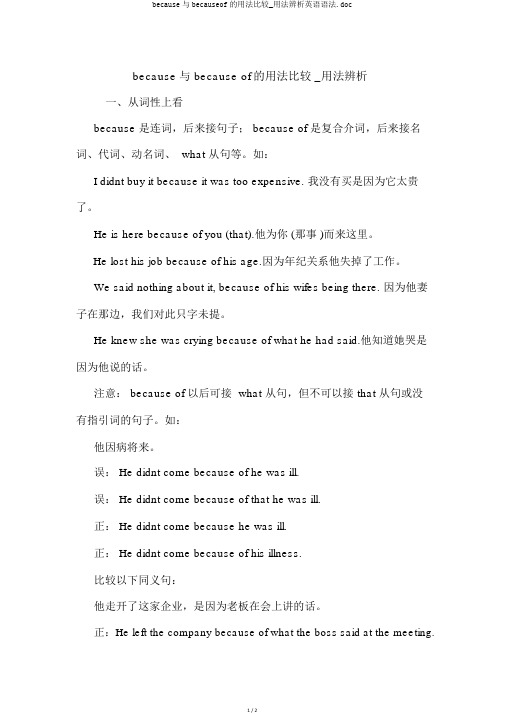
because与 because of的用法比较 _用法辨析一、从词性上看because 是连词,后来接句子; because of 是复合介词,后来接名词、代词、动名词、 what 从句等。
如:I didnt buy it because it was too expensive. 我没有买是因为它太贵了。
He is here because of you (that).他为你 (那事 )而来这里。
He lost his job because of his age.因为年纪关系他失掉了工作。
We said nothing about it, because of his wifes being there. 因为他妻子在那边,我们对此只字未提。
He knew she was crying because of what he had said.他知道她哭是因为他说的话。
注意: because of 以后可接what 从句,但不可以接 that 从句或没有指引词的句子。
如:他因病将来。
误: He didnt come because of he was ill.误: He didnt come because of that he was ill.正: He didnt come because he was ill.正: He didnt come because of his illness.比较以下同义句:他走开了这家企业,是因为老板在会上讲的话。
正:He left the company because of what the boss said at the meeting.正: He left the company because of the thing that the boss said at the meeting.我不可以因为有个家就停止斗争。
正: I cant stop fighting because I have a family.正: I cant stop fighting because of having a family.二、从用法上看because 所指引的从句除用作原由状语外,还可用作表语。
- 1、下载文档前请自行甄别文档内容的完整性,平台不提供额外的编辑、内容补充、找答案等附加服务。
- 2、"仅部分预览"的文档,不可在线预览部分如存在完整性等问题,可反馈申请退款(可完整预览的文档不适用该条件!)。
- 3、如文档侵犯您的权益,请联系客服反馈,我们会尽快为您处理(人工客服工作时间:9:00-18:30)。
( ) 8. He’s at home these days. You may come ________ today ________ tomorrow.
A. before B. because C. as soon as D. after
( ) 5. He is a teacher ________ I am a farmer.
A. or B. so C. but D. while
I’m in a slightly awkward position, in that he’s not arriving until the 10th.
我的处境有点难堪,因为他要10号才来。
连词专项练习
( ) 1. ________ it was early, she turned off the radio and went to bed.
连词because用法详解
1. 表示原因,语气较强,可用来回答 why 提出的问题。如:
A:Why do you love her? 你为什么爱她?
B:Because she is kind. 因为很善良。
2. because 除经常用于引导原因状语从句外,还可引出表语从句或用于强调句等。如:
As you weren’t there, I left a message. 由于你不在那儿,我留了个口信。
Since you are wrong, you should apologize. 你既然错了,就应该道歉。
b. since 可用于省略句,而其他三者不行:
Since so, I have nothing to say. 既然如此,我无话可说。
It must have rained last night, for the ground is wet this morning.
昨晚一定下过雨,你看今天早上地面是湿的。 (此句不能用 because 代 for)
初中英语每日训练之十一
引导结果状语从句的从属连词。
主要的有so that, so…that, such…that等。如:
之前有副词just修饰,一般认为not是否定从句而不是主句。如:
You shouldn’t get angry just because some people speak ill of you. 你不要因为有人说你坏话而生气。
6. 有时可引导一个句子作主语,此时通常采用just because这样的形式,并且主句谓语动词通常(当然不是
(3) 关于 for:是并列连词(其余三者为从属连词),它有时可表示因果关系(通常要放在主句之后,且可与
because 换用);有时不表示因果关系,而是对前面分句内容的解释或推断(也要放在主句之后,但不能
与because 换用)。比较:
The ground is wet, for (=because) it rained last night. 地面是湿的,因为昨晚下过雨。
(1) 关于 because:语气最强,表示直接原因,可用于回答 why 提出的问题、引导表语从句、用于强调
句等,而其余三者均不行:
“Why didn’t he come?” “Because he was ill.” “他为什么没来?”“因为他病了。”
My stomach hurts because I have eaten too many apples. 我肚子痛,因为苹果吃得太多。
Put the bookcase in that corner. 把书柜放在那个角落里。
You ought on no account to take part in that. 你千万别参与那事。
It is expensive to stay in that hotel. 住那家旅馆很贵。
2、如果用in that引导从句,则它是一个习语,意思是“因为”“由于”,与从属连词because意思相同。如:
It is because you’re eating too much. 那是因为你吃得太多了。
It was because I wanted to buy a dictionary that I went to town yesterday.
我昨天是由于想买本字典而进城的。
3. 汉语说“因为……所以……”,但英语却不能用 because…so…这样的结构。如:
他离开了这家公司,是因为老板在会上讲的话。
8. because of通常用来引导状语,而用于不引导表语(引导表语时可用 due to)。如:
误:His absence is because of the rain.
正:His absence is due to the rain. 他因雨未来。
5. 在not…because…这一结构中,not 有时否定主句,有时否定从句,具体视语境而定。一般说来,若 not
否定主句,最好在because 之前用逗号,否则会引起歧义,如下句在没有特定上下文时就有两种解释:
I didn’t go because I was afraid.
这个句子既可理解为“我没有去是因为怕”,也可理解为“我不是因为怕才去”。但是,如果because
导词的从句)等。如:
He is here because of you (that). 他为你(那事)而来这里。
We said nothing about it, because of his wife’s being there. 因为他妻子在那儿,我们对此只字未提。
He left the company because of what the boss said at the meeting.
He distrusted me because I was new. 他不信任我,因为我是新来的。
As you are sorry,I’ll forgive you. 既然你悔悟了,我就原谅你。
Since we’ve no money, we can’t buy it. 由于我们没钱,我们无法购买它。
Seeing that he’s ill he’s unlikely to come. 因为他病了,他大概不会来了。
Now that she has apologized, I am content. 既然她已经道了歉, 我也就满意了。
如何理解in that引导从句的用法
1、如果是作为自由搭配in that,那么它的意思需视上下文而定。如:
4. 汉语说“之所以……是因为……”,英语可以类似以下这样的句型(用that比用 because普通)。如:
The reason (why) I’m late is that [because] I missed the bus.
我迟到的原因是因为我没有赶上公共汽车。
传统语法认为这类句型不能用 because, 但在现代英语中用because 的情形已很普遍。
( ) 3. Work hard, ________ you’ll learn English well.
A. and B. but C. for D. or
( ) 4. You may go ________ you clean the classroom.
He shut the window with such force that the glass broke. 他关窗子用力很大, 结果玻璃震破了。
引导原因状语从句的从属连词,
主要的有because, as, since, seeing (that), now (that), considering (that) 等。如:
She was fortunate in that she had friends to help her. 她很幸运,有一些朋友帮助她。
The situation is rather complicated in that we have two managing directors.
由于我们有两位总经理,所以情况很复杂。
只是因为你年纪大了,这并不意味着你就应该懒散不活动。
Because you have words with your wife is no reason to smash up things.
你和你的妻子吵架并不能成为摔东西的理由。
7. 用于构成复合介词because of,其后可接名词、代词、 动名词、what 从句(但不能是that从句或没有引
It is because he is honest that I like him. 是因为他诚实我才喜欢他。
(2) 关于 since 与 as:
a. 两者所表示的原因都是人们已知的,即对已知事实提供理由,而不是表示直接原因。since 比 as 语气
稍强,且比 as 略为正式,它们引导的从句通常放在主句之前,有时也放在主句之后:
A. Because B. Though C. Since D. As
( ) 2. Which shirt is more expensive, the white one ________ the green one?
A. and B. or C. but D. so
一定)为mean。如:
Just because you speak English doesn’t mean you can teach it. 你会说英语并不意味着你能教英语。
Just because you’re old doesn’t mean you have to be idle.
